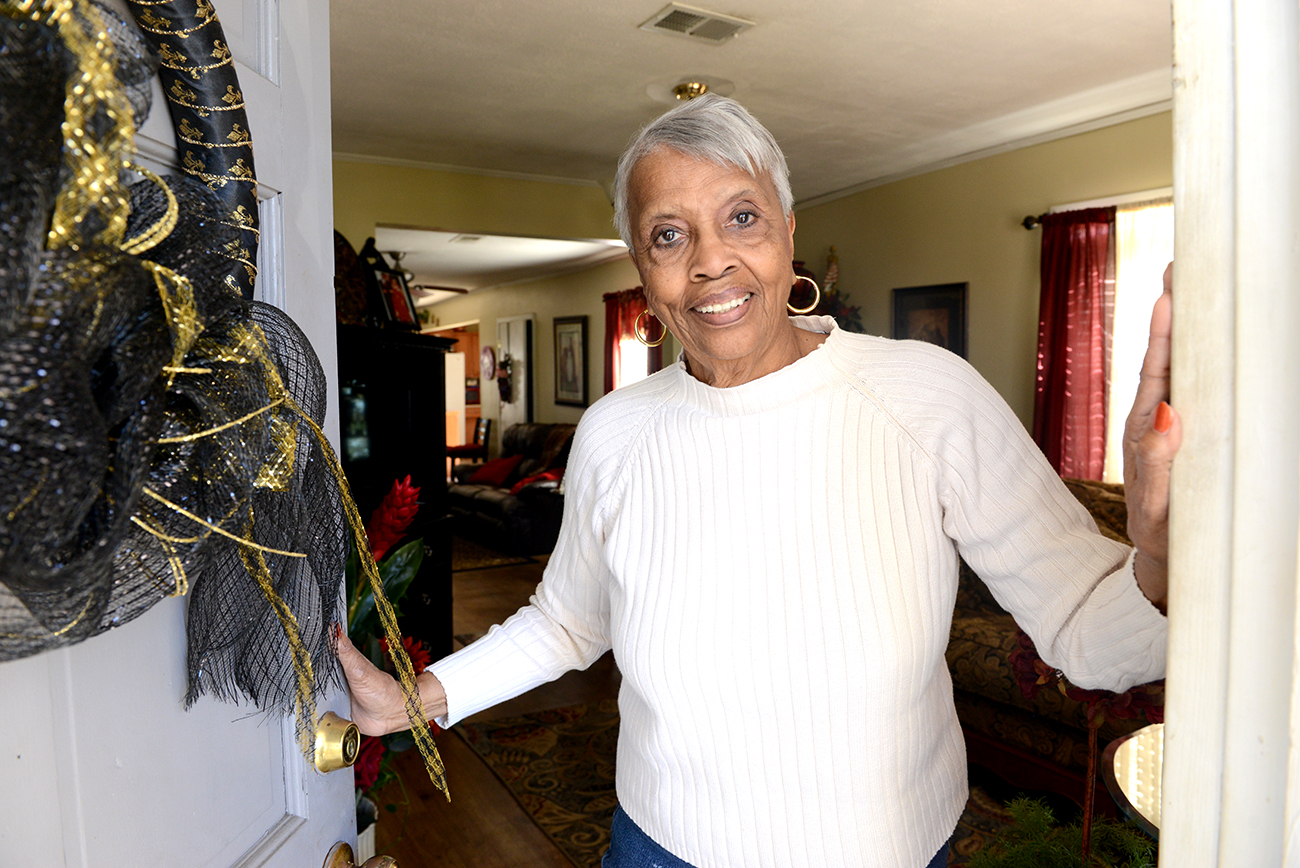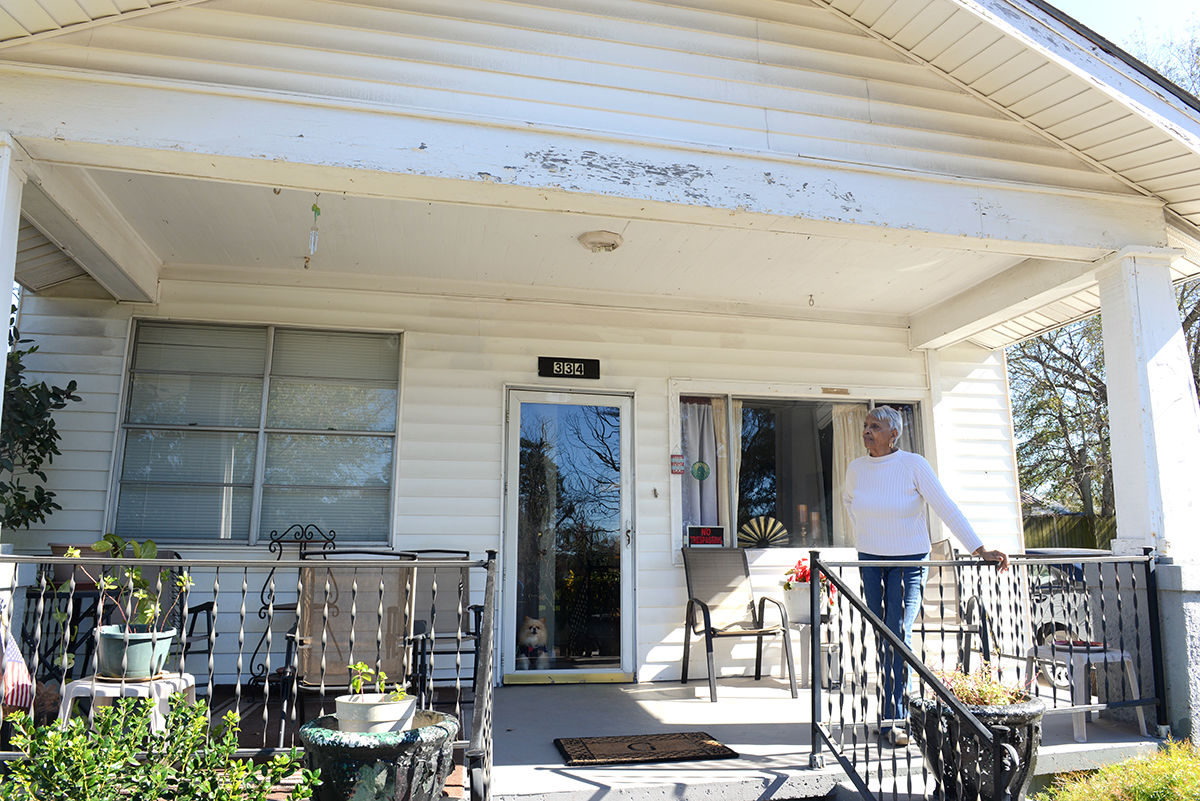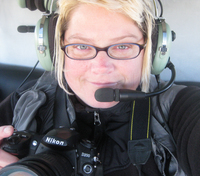
Daisy steps out, Duke darting out with a bark to see who’s coming. On the front door is a black wreathe carefully wrapped in gold ribbon, opening to a living room in black and reds.
It’s the same frame, but on the inside? Her home is all new. Katrina flooding rose seven feet, wiping away more than 47 years of her family’s life.
“We had to start from scratch. I was 73. Can you imagine that?” says Daisy. “Everything you had accumulated. In a matter of hours — you don’t have anything but what you have on.”
Before the storm, Daisy and her son, Thomas, had evacuated to Hattiesburg. Her son-in-law had a heck of a time driving her back to her Fayard Street home. Her daughter found her in the driveway before she tried to go inside.
“She said, ‘Mama, you ain’t gonna like what you see.,’ says Daisy. “ I peeked in the window and I just started crying.”
The fridge was clear to the other side of the room. The chandelier had fallen to the floor, covered in ankle-deep mud. Everything was upside down. Her son-in-law looked at her and told her, as long as they had a home? She has one too.
It was the beginning of many times — and years — people showed compassion and care. Often times, they were strangers.
Daisy is one of 70 homeowners for whom the volunteer crews from Livingston CARES helped with rebuilding. Hers was one of the first they worked on, in January 2006, months after the storm.
Tom Matthews, Livingston CARES board member, hauled a tub inside for Daisy’s bathroom on that trip.
“When we originally created Livingston CARES, we wanted to find a place where we could develop relationships and get to know people,” he says. “I’ve come back to visit her almost every year we’ve been here, over 10 years. We are connected to this place, this home and this person. “
Volunteers from many organizations, ripped everything up then rebuilt, with some surprises, like the wooden kitchen island.
“Oh, I was so happy,” Daisy says, remembering how the guys who installed it kept it a secret until they unveiled it for her. “They were so nice.”
When it was finally time to move in, Daisy and her daughter slept there before there was anything.
“There were no sheets, no nothing. But we had a bed,” she laughs. “I didn’t care. We were overjoyed.”
Where would she be without the volunteers? Not here. Not at her house, where she had made a home; where her memories are.
Daisy’s husband, a chef, died a long time ago. With her fixed income, she wouldn’t be able to rebuild. She imagines life in a senior apartment in Biloxi. Maybe Thomas could stay with her, now that he has had his leg amputated and has had a stroke. Here she can surely care for him. Soon, she needs to make his lunch. Her daughter Shaunda stays here, too. That would be impossible in senior housing, too.
“I’m just so thankful,” she says. “This has changed me, a lot.”
In such devastation, you are forced to see things differently, she says, when life is completely altered. Gone. Before the storm, Daisy says, she didn’t think much about the folks on food stamps, or those who were down and out. Not in the same way.
“You don’t think much because really, you’re living the good life. Then I found myself in the same line, to get whatever I could to survive,” she says. “I have six coats out in the back shed that I bought for children when I know someone needs them. It really changed me as a person.”
Often she looks around her house, and remembers. She tries not to think about the pain of the storm, but of the care so many showed her, and others.
Then there’s the fridge.
A volunteer told Daisy a member of her congregation heard about her and wanted to buy her a new one. The volunteer took her to a store, and invited her to choose one. They picked it out together — whatever she wanted, and put it on the gentleman’s credit card. He was never in Biloxi, or the state.
“To this day, if he walked in, I wouldn’t know who he was because he had never even been here,” she says, looking off. “This is why I appreciate the volunteers. They do things and they don’t even know you. They did so much for us. So much. It was terrible, this storm, but when things like this happen, it also shows us the best in people.”

